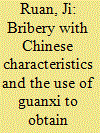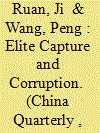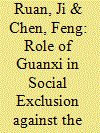|
|
|
Sort Order |
|
|
|
Items / Page
|
|
|
|
|
|
|
| Srl | Item |
| 1 |
ID:
163348


|
|
|
|
|
| Summary/Abstract |
Some scholars have attempted to find ways to distinguish guanxi from bribery, which can be difficult due to the role played by four traditional Chinese concepts and practices. First, people value the renqing ethic more than law, making it hard to judge whether a relation has “improper inducements.” Second, some interaction rituals used in bribery guanxi are a type of moral performance, undertaken to justify immoral practice – this mixes together guanxi practice with bribery. Third, some of the “ganqing” (affection) and esteem expressed in bribery guanxi results from this moral performance, rather than from genuine affection and esteem. Fourth, some people try to embody their relationship as an enduring guanxi, rather than one-off bribery, which exacerbates the difficulty in distinguishing guanxi from bribery. Because of the moralizing culture and the custom of mixing together renqinq and bribery, it can be difficult to distinguish bribery from guanxi by attempting to judge whether an action is purely based on esteem or coercion, on an enduring relationship or a one-off exchange, on improper inducement or proper conduct, or other such formal distinctions.
|
|
|
|
|
|
|
|
|
|
|
|
|
|
|
|
| 2 |
ID:
190408


|
|
|
|
|
| Summary/Abstract |
This article presents a qualitative empirical study of elite collusion and its influence on village elections and rural land development in China. Drawing on ethnographic data collected from two Chinese villages, it investigates how village cadres collude with other rural elites, using bribery, gift-giving and lavish banquets, to establish reciprocal ties with township officials and other public officials. Meanwhile, the officials make use of formal organizations to corruptly obtain profits and form alliances with village elites. The article examines how rural elites, especially village cadres, use this collusion to profit from the misuse of villagers’ collectively owned assets, the manipulation of village elections and the suppression of anti-corruption protests. It also offers new descriptive evidence of how recent reforms designed to strengthen the Party's overall leadership in rural governance may have actually facilitated elite capture and grassroots corruption.
|
|
|
|
|
|
|
|
|
|
|
|
|
|
|
|
| 3 |
ID:
173259


|
|
|
|
|
| Summary/Abstract |
This article is based on two case studies of social exclusion in two Chinese villages against the background of social stratification.Five types of social exclusion of the poor—housing, marriage, renqing, ritual, and gossip exclusion—are identified, which shrink the guanxi networks held by the poor. This in turn weakens their social and ritual capital and lowers their social status,leading to the reproduction of inequality. The research presented here finds that the vertical exclusiveness of guanxi, which is based on the concepts of in-group and out-group separation, superior and inferior separation, and symmetrical reciprocity, results in social exclusion of the poor. This process is underpinned by the instrumental use of the traditional Confucian ritual(li), in which ideas of modern social welfare, equality, and universalism are insufficient.
|
|
|
|
|
|
|
|
|
|
|
|
|
|
|
|
|
|
|
|
|